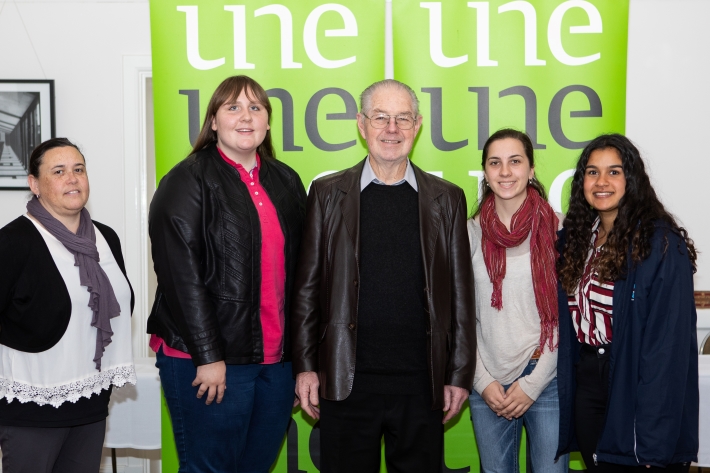The University of New England (UNE) has received a $1.25 million donation from alumnus and philanthropist Max Schroder to support scholarships programs for Aboriginal and Torres Strait Islander students.
Mr Schroder studied at UNE, worked at the Armidale Teachers’ College and at universities in Sydney, where he became one of the founders of leading global educational provider Navitas Ltd.
His generous donation will extend UNE’s current Max Schroder Scholarship Program over the next decade, providing tertiary education opportunities to a new generation of indigenous students.
“Mr Schroder is already one of our most significant living benefactors and this generous gift is one of the largest single donations we have received since the founding of the University in 1938,” said Professor Brigid Heywood, UNE Vice Chancellor and CEO. “It is the leadership and generosity of our alumni that helps to create new opportunities for our students and the communities that we work with. Max is an exemplar of both a committed educational sponsor and active alumnus.”
“UNE currently has over 1000 Aboriginal and Torres Strait Islander students enrolled and we are extremely proud of the work that we have been doing to enable students from these communities to access tertiary education.
“Their success in this stage of their life journey often depends upon providing them with effective support through the programs of our Oorala Aboriginal Centre and scholarships such as those that Max funds,” Professor Heywood said.
Since 2008, Mr Schroder has provided funding of $500,000 for over 40 students who have participated in the Max Schroder Indigenous Scholarships programme, received an Ella Schroder Indigenous Scholarship, or a Max Schroder Mentoring Scholarship for Indigenous Students at the University of New England.
Max Schroder has been supporting up to 15 UNE students a year through scholarships for undergraduate students living in a UNE residential college, Indigenous students who went through boarding school (the Ella Schroder scholarships named for his mother), or post-graduate or final-year students who can act as mentors to their undergraduate peers.
Through his ongoing generosity, Mr Schroder has made a personal commitment to addressing the inequality many Indigenous Australians experience.
Max Schroder
University of New England alumnus and humanitarian, Max Schroder, studied at Armidale Teachers’ College in 1959-60, gained BA (Honours) degree in 1969 and Master of Arts in 1974 from the University of New England by distance education. Starting his career as a teacher Max then became a lecturer and senior administrator at one of UNE’s predecessor institutions, the Armidale Teachers’ College (which later became the Armidale College of Advanced Education). His interest in Indigenous issues and education began in the 1960s when he was teaching Aboriginal students in Armidale. He also spent time in Indigenous communities in the Northern Territory.
Max was a leading pioneer of the education export industry in Australia, beginning in 1988 as Academic Registrar of the University of New South Wales, then as the Director of International Programs for UNSW from 1990 to 1996. In 1997, with others, he established Sydney Institute of Business and Technology (SIBT), a private higher education institution, in collaboration with Macquarie University. Managed by IBT Education Group, in late 2004 the Group became a public company with Max as one of the founders. IBT Education Ltd moved very rapidly to a listing on the Australian Stock Exchange in 2004 and later changed its name to Navitas Ltd. Max retired from the company soon after.
It was the sale of his share holdings in the listed company Navitas Ltd in 2019 that provided the scholarship funds "to enable me to assist others from challenged and disadvantaged backgrounds to gain the opportunities I enjoyed".
“Since the scholarship programs have been running for a number of years, and developing to address newly perceived needs, it has been my intention and expressed wish that a pragmatic approach always be taken,” he said. “The environment will inevitably change, in ways that we can only speculate about, and it is imperative that flexible methods are employed to achieve our intentions, and to ensure the best educational outcomes for our indigenous students.”
Background on Indigenous students at UNE:
The University of New England is committed to improving higher education and employment outcomes for Aboriginal and Torres Strait Islander Australians. Indigenous student numbers at UNE have been growing steadily over the past decade, with the number of Indigenous students at UNE as a percentage of total student body consistently exceeding the national average.
More than 1000 Indigenous students are currently enrolled at UNE, the majority of them female and most from regional areas. In addition:
- about one-quarter come from low SES backgrounds;
- 53% are the first in their family to take up tertiary studies; and
- 15% have indicated they have a disability.
As at August 2019:
- the number of on-campus students increased from 156 to 199;
- the number of post-graduate coursework students increased from 107 to 129;
- the number of undergraduate students increased from 598 to 688; and
- the number of enabling students increased from 91 to 93.
The Oorala Aboriginal Centre at UNE.
Scholarship Applications now open:
Applications are currently open for the Schroder scholarships program including:
- Ella Schroder Indigenous Residential Scholarship ($10,000/year)
- Max Schroder UNE Scholarship ($6,000/year)
- Max Schroder Indigenous Mentoring Scholarship (up to $8,000/year)


